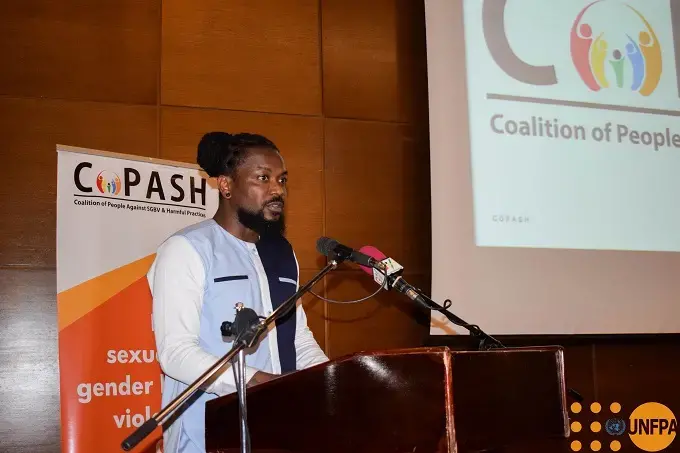Female Genital Mutilation is the non-medical cutting of parts of the female genitalia, which is prevalent in some parts of northern Ghana. Every year since 2003, UNFPA joins the world to mark 6th February as the International Day for Zero Tolerance for Female Genital Mutilation. This year 2020, UNFPA Ghana partnered with the Upper East Regional Coordinating Council, the Pusiga District Assembly, the Belim Wusa Development Agency, the Ghana Health Service and the Ghana Association for Women’s Welfare to mark the day with a symposium under the theme: "Unleashing Youth Power: One decade of accelerating actions for zero female genital mutilation." The event was held at the Pusiga in the Upper East Region.
In attendance were representatives from these partner organizations, as well as young FGM survivors and their parents, ‘excisors’ (the cutters), traditional rulers and community leaders. At the symposium, Wasila Iddrisu a survivor, and Setu Musah a former ‘promoter’ spoke out against female genital mutilation.
“I am pleading with all perpetuators to stop the practice because it has many side effects on the victims.”- Wasila Iddrisu
Wasila Iddrisu is a 22-year-old graduate of the Bawku Senior High Technical School. She lives with her parents, three younger brothers and a younger sister at Zepaliga, a community close to Pusiga. One school day, when Wasila was 10 years old, her grandmother told her to stay home for a very important meeting since she is the eldest of her siblings. Her father, who was a teacher had left for work, her mother had travelled, and her brothers were also in school. Wasila was left at home alone with her grandmother. When some individuals arrived at her home for the ‘meeting’ she soon deduced what it was all about. They had come to circumcise her. She run away from the house. Unfortunately, she was chased down and brought back. Under the supervision of her grandmother, Wasila was circumcised.
Wasila recounted her experience: “It was very painful. I used to dread urinating and would hold my urine for hours and When I could not take it anymore, I cried when passing the urine.” I could not wear clothes for weeks. The wound was itchy, smelly and sometimes, it bled. I constantly had infections.
Fortunately, Wasila’s younger sister was not circumcised because her parents were against it. Her father in particular was furious when he learnt what had happened. He warned Wasila’s grandmother to never again attempt the practice on any of his children.
“After my first sensitization programme that I attended on Female Genital Mutilation, I took all my daughters who were circumcised to the hospital to be screened for infections.”- Setu Musah
Setu Musah an Ashanti by tribe got married to a man whose culture practiced FGM. She now lives at Kampode in the Pusiga District. She joined her husband’s family as an uncircumcised woman. However, when her daughters were born, her mother-in-law insisted that the girls go through FGM as a traditional requirement. Setu therefore adopted the practice of female genital mutilation and consented to her children’s mutilation. She was so influenced by her mother in-law that she became a promoter of FGM.
Now, thanks to UNFPA, Setu knows better. She has learnt about the negative side-effects of FGM, especially how obstructive it is to natural child-bearing and the psychological trauma it brings. She is now a self-proclaimed activist against FGM in her community. Anytime she attends a UNFPA sensitization programme, she goes back and shares all the information with members of her community.
“I cannot take back what I did to my children, but I can help stop the practice so other girls do not have to suffer like this.”
Stories like Wasila’s are abundant in the Pusiga District. Many of these young girls are calling with one voice for efforts to be intensified to end FGM in all its forms in Ghana and beyond. Thankfully, gradual progress is being made in the lives of women like Setu.



